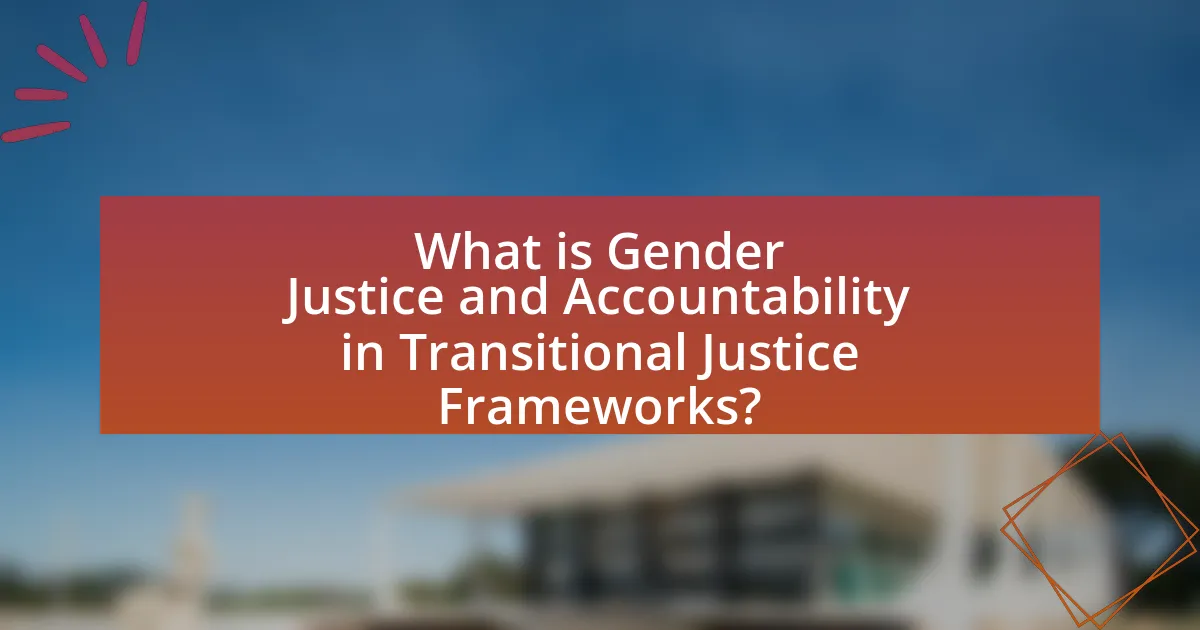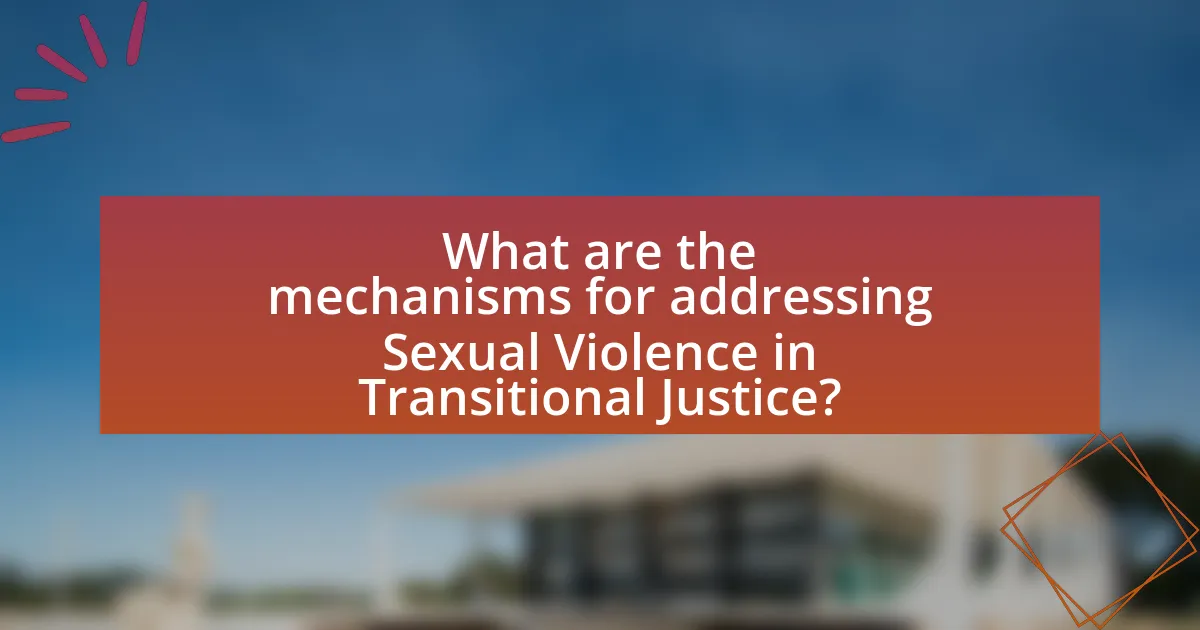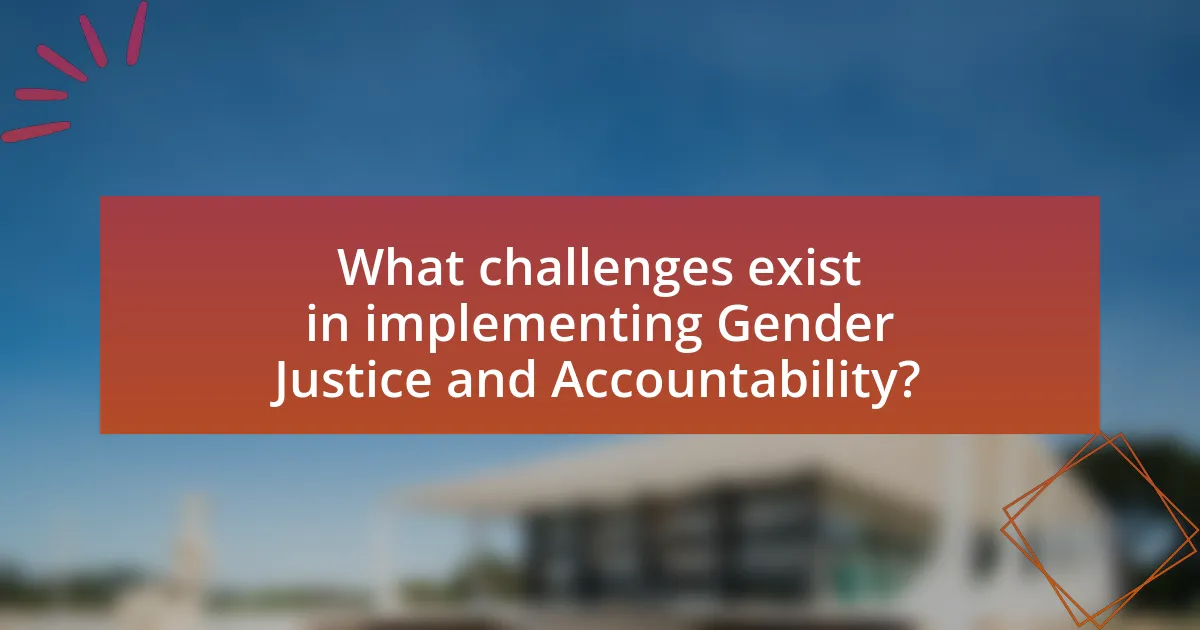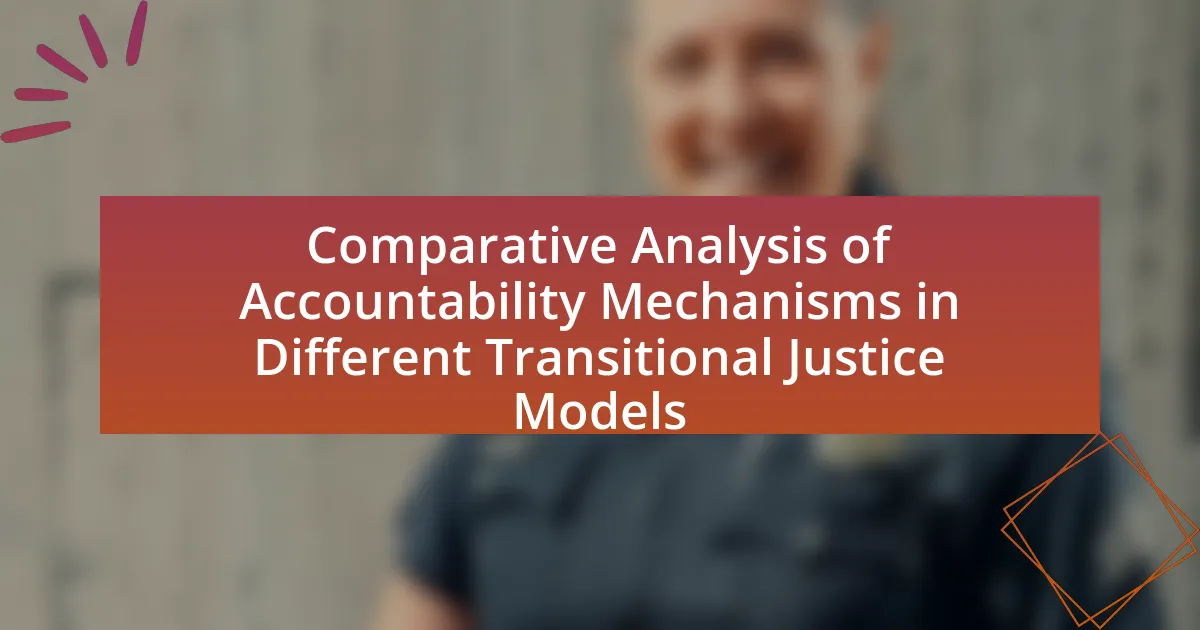Gender justice and accountability in transitional justice frameworks focus on addressing gender-based violence, particularly sexual violence, during political transitions. These frameworks aim to recognize, redress, and prevent such violence, emphasizing the specific needs of women and marginalized genders who are disproportionately affected in conflict situations. Key principles include equality, accountability, and inclusivity, supported by international laws like the United Nations Security Council Resolution 1325. The article explores the intersection of gender justice with transitional justice, the mechanisms for addressing sexual violence, the challenges faced in implementation, and the roles of legal frameworks, institutions, and advocacy groups in promoting accountability and justice for survivors.

What is Gender Justice and Accountability in Transitional Justice Frameworks?
Gender justice and accountability in transitional justice frameworks refer to the principles and mechanisms that ensure the recognition, redress, and prevention of gender-based violence, particularly sexual violence, during periods of political transition. These frameworks aim to address the specific needs and rights of women and marginalized genders, acknowledging that they often suffer disproportionately during conflicts and transitions. For instance, the United Nations Security Council Resolution 1325 emphasizes the importance of women’s participation in peace processes and the need for accountability for sexual violence as a tactic of war. This resolution serves as a foundational document that guides the integration of gender justice into transitional justice efforts, ensuring that victims receive justice and that perpetrators are held accountable.
How do Gender Justice and Accountability intersect with Transitional Justice?
Gender justice and accountability intersect with transitional justice by ensuring that the specific needs and rights of women and marginalized genders are addressed in post-conflict settings. Transitional justice mechanisms, such as truth commissions and tribunals, must incorporate gender-sensitive approaches to effectively address sexual violence and discrimination experienced during conflicts. For instance, the United Nations Security Council Resolution 1325 emphasizes the importance of women’s participation in peace processes and the need for accountability for gender-based violence. This intersection is crucial for achieving comprehensive justice and fostering societal healing, as evidenced by case studies from countries like Rwanda and Bosnia, where gender-focused transitional justice initiatives have led to improved outcomes for survivors of sexual violence.
What are the key principles of Gender Justice in this context?
The key principles of Gender Justice in the context of addressing sexual violence in transitional justice frameworks include equality, accountability, and inclusivity. Equality ensures that all genders have equal rights and access to justice, which is crucial in addressing the historical injustices faced by marginalized groups. Accountability mandates that perpetrators of sexual violence are held responsible, thereby reinforcing the rule of law and deterring future violations. Inclusivity emphasizes the need for the participation of diverse gender identities in the transitional justice process, ensuring that their experiences and needs are recognized and addressed. These principles are supported by international frameworks such as the United Nations Security Council Resolution 1325, which highlights the importance of gender perspectives in peace and security efforts.
How is Accountability defined within Transitional Justice frameworks?
Accountability within Transitional Justice frameworks is defined as the obligation of state and non-state actors to answer for their actions, particularly in relation to human rights violations and crimes committed during periods of conflict or repression. This concept emphasizes the need for mechanisms that ensure justice, truth, and reparations for victims, thereby fostering societal healing and preventing future atrocities. For instance, the International Criminal Court (ICC) and various truth commissions serve as institutional examples that hold perpetrators accountable, reflecting the global commitment to addressing past injustices and promoting gender justice, especially concerning sexual violence.
Why is addressing Sexual Violence critical in Transitional Justice?
Addressing sexual violence is critical in transitional justice because it acknowledges and seeks to rectify the profound harm inflicted on individuals and communities during periods of conflict or repression. This form of violence often serves as a tool of war and oppression, disproportionately affecting women and marginalized groups, and its recognition is essential for achieving comprehensive accountability and healing. Historical evidence shows that in post-conflict societies, such as in the Balkans and Rwanda, failing to address sexual violence perpetuates cycles of trauma and undermines societal stability. Furthermore, addressing sexual violence in transitional justice frameworks promotes gender justice, ensuring that victims receive recognition, reparations, and support, which is vital for rebuilding trust in institutions and fostering social cohesion.
What forms of Sexual Violence are prevalent in conflict and post-conflict settings?
Sexual violence in conflict and post-conflict settings predominantly includes rape, sexual slavery, forced prostitution, and sexual exploitation. These forms of violence are often used as weapons of war to humiliate, control, and terrorize communities. For instance, the United Nations has documented widespread instances of rape during conflicts in countries such as the Democratic Republic of the Congo and Bosnia, highlighting that in some cases, up to 60% of women in conflict zones may experience sexual violence. Additionally, the International Criminal Court has recognized sexual violence as a crime against humanity, further validating its prevalence and impact in these settings.
How does Sexual Violence impact communities during and after conflict?
Sexual violence significantly disrupts communities during and after conflict by inflicting physical and psychological harm on individuals, leading to long-term societal consequences. During conflict, sexual violence serves as a weapon of war, aiming to instill fear, exert control, and destabilize social structures. For instance, the United Nations reports that in conflicts such as the Rwandan Genocide, sexual violence was systematically used to terrorize populations and displace communities. After conflict, the repercussions continue as survivors often face stigma, isolation, and a lack of access to healthcare, which can hinder community recovery and reconciliation efforts. Research by the World Health Organization indicates that communities with high rates of sexual violence experience increased mental health issues, economic instability, and weakened social cohesion, further complicating post-conflict recovery.

What are the mechanisms for addressing Sexual Violence in Transitional Justice?
Mechanisms for addressing sexual violence in transitional justice include legal frameworks, truth commissions, reparations, and community-based approaches. Legal frameworks establish accountability through national and international laws, such as the Rome Statute of the International Criminal Court, which recognizes sexual violence as a war crime and crime against humanity. Truth commissions, like the South African Truth and Reconciliation Commission, provide a platform for survivors to share their experiences, fostering acknowledgment and healing. Reparations programs offer financial and social support to victims, as seen in the case of the Guatemalan reparations program, which aimed to address historical injustices. Community-based approaches engage local organizations to support survivors and promote awareness, ensuring that responses are culturally sensitive and effective. These mechanisms collectively aim to provide justice, recognition, and support for survivors of sexual violence in post-conflict settings.
How do legal frameworks incorporate Gender Justice and Accountability?
Legal frameworks incorporate Gender Justice and Accountability by establishing laws and policies that specifically address gender-based violence and discrimination, ensuring that victims receive justice and perpetrators are held accountable. For instance, international treaties such as the Convention on the Elimination of All Forms of Discrimination Against Women (CEDAW) mandate state parties to eliminate discrimination against women and promote gender equality. Additionally, national laws often include provisions for the prosecution of sexual violence, reflecting commitments made in international agreements. Countries implementing these frameworks have seen improvements in reporting and prosecuting gender-based crimes, as evidenced by increased convictions in jurisdictions that prioritize gender-sensitive legal practices.
What international laws and conventions support these frameworks?
International laws and conventions that support frameworks addressing sexual violence in transitional justice include the Convention on the Elimination of All Forms of Discrimination Against Women (CEDAW), the Rome Statute of the International Criminal Court, and the United Nations Security Council Resolution 1325 on Women, Peace, and Security. CEDAW obligates states to eliminate discrimination against women and promote gender equality, providing a legal basis for addressing sexual violence. The Rome Statute defines sexual violence as a crime against humanity and establishes accountability mechanisms for perpetrators. UNSC Resolution 1325 emphasizes the importance of women’s participation in peace processes and the protection of women and girls from sexual violence in conflict, reinforcing the need for gender-sensitive approaches in transitional justice.
How do national laws reflect Gender Justice principles?
National laws reflect Gender Justice principles by incorporating legal frameworks that promote equality, protect against discrimination, and ensure accountability for gender-based violence. For instance, many countries have enacted laws that criminalize domestic violence and sexual assault, aligning with international conventions such as the Convention on the Elimination of All Forms of Discrimination Against Women (CEDAW). These laws often mandate state obligations to provide support services for survivors, thereby reinforcing the principle of justice and protection for marginalized genders. Additionally, legal reforms in various nations have aimed to eliminate discriminatory practices in areas such as inheritance, employment, and family law, further demonstrating a commitment to gender equality and justice.
What roles do institutions play in ensuring accountability for Sexual Violence?
Institutions play a critical role in ensuring accountability for sexual violence by establishing legal frameworks, providing support services, and facilitating investigations. Legal institutions, such as courts and law enforcement agencies, are responsible for enforcing laws against sexual violence, ensuring that perpetrators are prosecuted and victims receive justice. For example, the International Criminal Court has prosecuted individuals for sexual violence as a war crime, highlighting the importance of institutional accountability at an international level. Additionally, social institutions, including healthcare and support services, offer essential resources for survivors, helping them navigate the aftermath of violence and encouraging reporting. Research indicates that effective institutional responses can lead to increased reporting rates and improved outcomes for victims, thereby reinforcing the accountability mechanisms in place.
How do truth commissions address Sexual Violence in their mandates?
Truth commissions address sexual violence in their mandates by explicitly including it as a key area of investigation and documentation. These commissions often recognize sexual violence as a serious violation of human rights and a critical aspect of the broader context of conflict or systemic oppression. For instance, the Truth and Reconciliation Commission in South Africa included provisions to address sexual violence, allowing survivors to share their experiences and seek acknowledgment. Additionally, the Commission on the Status of Women has emphasized the importance of documenting sexual violence in transitional justice processes, highlighting that such recognition is essential for accountability and healing. This approach not only validates the experiences of survivors but also contributes to a more comprehensive understanding of the impacts of violence in society.
What is the role of courts in prosecuting Sexual Violence cases?
Courts play a crucial role in prosecuting sexual violence cases by providing a legal framework for the adjudication of such offenses, ensuring justice for victims and accountability for perpetrators. They evaluate evidence, hear testimonies, and apply relevant laws to determine guilt or innocence, thereby upholding the rule of law. Courts also serve as a platform for victims to seek redress and support, which is essential in the context of gender justice. According to the United Nations, effective judicial responses to sexual violence are vital for deterring future offenses and fostering societal change, as they reinforce the message that such acts will not be tolerated.

What challenges exist in implementing Gender Justice and Accountability?
Implementing Gender Justice and Accountability faces several challenges, including systemic discrimination, lack of political will, and inadequate legal frameworks. Systemic discrimination often manifests in societal norms that perpetuate gender inequality, making it difficult to achieve justice for victims of sexual violence. The lack of political will is evident when governments fail to prioritize gender justice initiatives, often due to competing interests or fear of backlash. Additionally, inadequate legal frameworks hinder accountability, as existing laws may not adequately address gender-based violence or provide sufficient protections for victims. These challenges are compounded by insufficient resources and support systems for survivors, which further obstruct the implementation of effective gender justice measures.
What barriers hinder the effective prosecution of Sexual Violence?
Barriers that hinder the effective prosecution of sexual violence include victim stigma, lack of evidence, and inadequate legal frameworks. Victim stigma often leads to underreporting, as survivors fear social repercussions and disbelief. The lack of physical evidence, which is common in sexual violence cases, complicates prosecution efforts, making it difficult to meet the burden of proof required in court. Additionally, many legal systems lack comprehensive laws addressing sexual violence, resulting in insufficient protections for victims and inadequate penalties for perpetrators. These factors collectively contribute to low conviction rates and a culture of impunity surrounding sexual violence.
How do societal attitudes towards Gender and Sexual Violence impact justice efforts?
Societal attitudes towards gender and sexual violence significantly hinder justice efforts by perpetuating stigma and victim-blaming. These attitudes often lead to underreporting of incidents, as victims may fear social repercussions or disbelief from authorities. For instance, a study by the World Health Organization found that societal norms that condone violence against women contribute to a culture where victims are discouraged from seeking justice. Additionally, when legal systems reflect these societal biases, they may prioritize the perpetrator’s rights over the victim’s, resulting in inadequate legal responses and low conviction rates. This cycle reinforces the notion that gender and sexual violence are not serious offenses, further obstructing justice and accountability.
What are the limitations of existing Transitional Justice mechanisms?
Existing Transitional Justice mechanisms often fail to adequately address the specific needs of survivors of sexual violence. These mechanisms typically prioritize legal accountability and truth-telling, which can overlook the unique experiences and trauma of gender-based violence victims. For instance, many truth commissions do not include comprehensive frameworks for addressing sexual violence, leading to underreporting and a lack of recognition of these crimes. Additionally, the focus on formal judicial processes can marginalize informal community-based approaches that may be more effective in certain cultural contexts. Research indicates that survivors often feel alienated from formal justice systems, which can exacerbate their trauma rather than facilitate healing.
How can these challenges be overcome?
To overcome challenges in addressing sexual violence within transitional justice frameworks, it is essential to implement comprehensive legal reforms that prioritize gender justice. These reforms should include the establishment of specialized courts and legal mechanisms that focus on sexual violence cases, ensuring that survivors receive fair treatment and justice. Evidence from various transitional justice contexts, such as the International Criminal Tribunal for the former Yugoslavia, demonstrates that dedicated legal frameworks can significantly improve accountability and support for survivors. Additionally, integrating survivor voices into the design and implementation of transitional justice processes enhances their effectiveness and relevance, as seen in the experiences of countries like South Africa and Rwanda.
What best practices can enhance accountability for Sexual Violence?
Implementing comprehensive legal frameworks that prioritize victim rights and ensure perpetrators are held accountable enhances accountability for sexual violence. Such frameworks should include clear definitions of sexual violence, accessible reporting mechanisms, and protections for victims against retaliation. For instance, countries with specialized sexual violence laws, like Sweden, have seen increased reporting rates and successful prosecutions, demonstrating the effectiveness of legal clarity and victim support. Additionally, training law enforcement and judicial personnel on trauma-informed approaches can improve the handling of cases, leading to higher conviction rates and greater trust in the justice system. Research indicates that when victims feel supported and understood, they are more likely to report incidents, thereby increasing accountability.
How can community engagement improve Gender Justice outcomes?
Community engagement can significantly improve Gender Justice outcomes by fostering inclusive dialogue and collaboration among diverse stakeholders. This engagement allows for the identification of specific gender-related issues within communities, ensuring that the voices of marginalized groups, particularly women and gender minorities, are heard and considered in decision-making processes. Research indicates that participatory approaches in transitional justice frameworks lead to more effective and equitable outcomes, as they empower communities to address their unique challenges related to sexual violence and gender discrimination. For instance, the United Nations Development Programme highlights that community-driven initiatives can enhance accountability mechanisms and promote social norms that support gender equality, ultimately leading to a reduction in gender-based violence and improved justice for survivors.
What practical steps can be taken to promote Gender Justice in Transitional Justice?
To promote Gender Justice in Transitional Justice, it is essential to integrate gender perspectives into all phases of the transitional justice process. This includes ensuring women’s participation in decision-making bodies, which has been shown to lead to more comprehensive and inclusive justice outcomes. For instance, the UN Security Council Resolution 1325 emphasizes the importance of women’s involvement in peace and security processes, highlighting that their participation can improve the effectiveness of transitional justice mechanisms. Additionally, establishing gender-sensitive legal frameworks that specifically address sexual violence and gender-based crimes is crucial. Research indicates that jurisdictions with such frameworks are more likely to hold perpetrators accountable and provide justice for victims. Furthermore, training for justice officials on gender issues can enhance their understanding and responsiveness to gender-based violence, thereby improving the overall effectiveness of transitional justice initiatives.
What role can advocacy groups play in this process?
Advocacy groups play a crucial role in addressing sexual violence within transitional justice frameworks by raising awareness, influencing policy, and providing support to survivors. These organizations mobilize communities, advocate for legal reforms, and ensure that the voices of marginalized groups are heard in the justice process. For instance, advocacy groups have successfully lobbied for the inclusion of sexual violence in international legal definitions, as seen in the Rome Statute of the International Criminal Court, which recognizes sexual violence as a war crime. Their efforts contribute to creating a more comprehensive and inclusive approach to justice that holds perpetrators accountable and supports survivors in their healing process.
How can education and awareness campaigns contribute to change?
Education and awareness campaigns can significantly contribute to change by informing individuals about gender justice issues and the impact of sexual violence within transitional justice frameworks. These campaigns raise public consciousness, leading to increased advocacy for policy reforms and legal accountability. For instance, research by the United Nations indicates that educational initiatives can reduce stigma and promote understanding of survivors’ rights, which is essential for fostering a supportive environment for reporting and addressing sexual violence. Furthermore, awareness campaigns have been shown to mobilize communities, encouraging collective action and support for victims, thereby creating a cultural shift towards accountability and justice.



